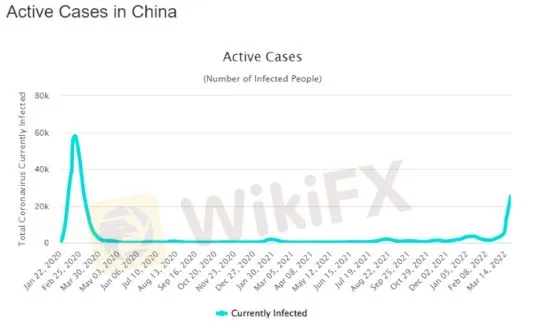简体中文
繁體中文
English
Pусский
日本語
ภาษาไทย
Tiếng Việt
Bahasa Indonesia
Español
हिन्दी
Filippiiniläinen
Français
Deutsch
Português
Türkçe
한국어
العربية
Oil Rally May Stall on China Covid Woes, Fed Rate Hikes
Abstract:WTI crude and Brent crude oil prices rocketed higher in the first quarter of the year as Covid-related lockdowns and restrictions were rolled back across major economies, fueling a surge in demand.
WTI crude and Brent crude oil prices rocketed higher in the first quarter of the year as Covid-related lockdowns and restrictions were rolled back across major economies, fueling a surge in demand. That increase in demand quickly outpaced rising supply levels. Then, in February, Russia invaded Ukraine. A volley of Western sanctions followed, effectively severing Russias connection to global financial markets. The United States and Britain moved to ban Russian oil exports, although the European Union refrained, fearing an energy crisis.
Still, the confusion around quickly evolving sanctions as well as the removal of Russian banks from the SWIFT messaging system has made buyers and foreign shippers hesitant to take delivery from Russian ports. Although not formally targeted by much of the Western alliance, Russias oil industry, which supplies around 10 million barrels per day to the global market, was thrown into chaos. Oil prices responded with Brent crude oil hitting its highest level since 2008.
However, there is potential for a near-term pullback even as demand around the world picks up. That pullback may come if Ukraine and Russia negotiate an end to the war. Such negotiations could lead to a removal of some Western sanctions, potentially reopening the taps on Russias energy products, at least to a degree. Outside of the supply factor, an end to the war would also remove the geopolitical risk premium in prices.

There also exists a chance that the energy market‘s demand-side may ease due to a Covid outbreak in China. A drop in demand for Asia’s largest oil consumer would likely be followed by a contraction in imports, easing pressure on strained supply capacity. China is reportedly soaking up some of Russias new spare capacity, but it still sources much of its oil from other countries.
The Beijing auto show that was scheduled for late April was canceled amid Chinas worst Covid outbreak since the pandemic began. Other major events in China are likely to suffer the same fate until the outbreak is contained. Widespread cancellations would open the door for a pullback, with bearish factors compounded by the chance for a more aggressive 50 basis point rate hike from the Federal Reserve in May.
Disclaimer:
The views in this article only represent the author's personal views, and do not constitute investment advice on this platform. This platform does not guarantee the accuracy, completeness and timeliness of the information in the article, and will not be liable for any loss caused by the use of or reliance on the information in the article.
Read more

Why Is UK Inflation Rising Again Despite Recent Lows?
October inflation rises to 2.3%, driven by energy costs. Renters face 8% annual hikes, while house price inflation climbs. Interest rates stay elevated.

Morgan Stanley Gains Approval to Launch Futures Business in China
Morgan Stanley secures regulatory approval to enter China's futures market, expanding its presence and joining J.P. Morgan in the rapidly growing derivatives sector.

Hong Kong’s Bold Move: AI Framework & Tax Incentives Set to Boost Fintech Growth
Hong Kong is strengthening its position as a fintech leader with the introduction of new policies that support artificial intelligence (AI) integration in the financial sector and explore tax breaks for virtual asset investments.

How Inflation Rates Affect Forex Prices Globally
In this article, we’ll explore how inflation affects forex prices globally, the relationship between inflation and currency value, and why traders monitor inflation closely.
WikiFX Broker
Latest News
Elon Musk Warns of Imminent US Bankruptcy | Bitcoin Retreats from $100K
WikiEXPO Global Expert Interview: Advanced Practices and Insights in Financial Regulation
Justin Sun Invests $30M in Trump-Backed World Liberty Financial
Robinhood Launches Ethereum Staking with 100% Rewards Match
Kraken Closes NFT Marketplace Amid New Product Focus
Philippine Banks Launch PHPX Stablecoin to Transform Payments
Broker Review: Is FOREX.com a solid Broker?
Tether to Discontinue EURt Stablecoin Amid Regulatory Shifts in Europe
Adani’s Bribery Scandal! SEC Charges, Major Fallout & Adani’s Stand
Unleash Your Trading Skills: Join the WikiFX KOL India Trading Competition!
Currency Calculator


